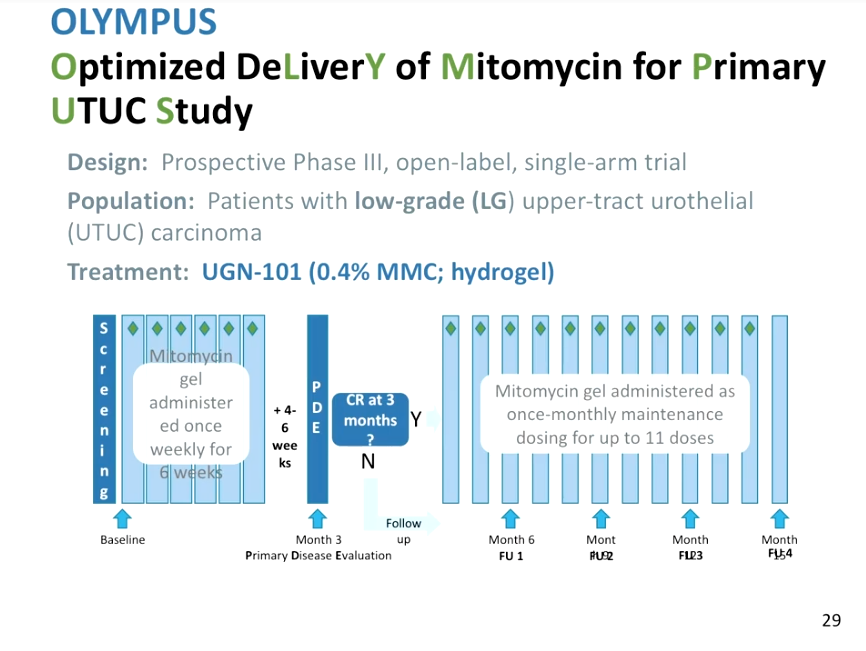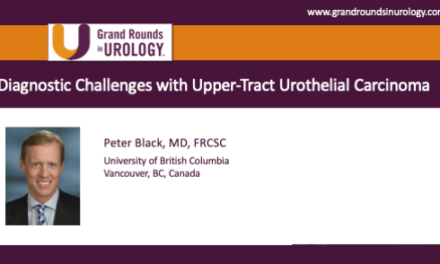Raoul S. Concepcion, MD, FACS, presented “Upper Tract Urothelial Cancer: What You Need to Know” during the 27th Annual Perspectives in Urology: Point Counterpoint on November 9, 2018 in Scottsdale, Arizona.
How to cite: Concepcion, Raoul S. “Upper Tract Urothelial Cancer: What You Need to Know” November 9, 2018. Accessed Jul 2025. https://grandroundsinurology.com/upper-tract-urothelial-cancer-what-you-need-to-know/
Upper Tract Urothelial Cancer: What You Need to Know –
Summary:
Raoul S. Concepcion, MD, FACS, provides an overview of the epidemiology of upper tract urothelial carcinoma (UTUC). He discusses the most recent efforts in improving management for the disease, particularly focusing on neoadjuvant chemotherapy when treating high-grade tumors and nonsurgical ways to combat low-grade UTUC.
Abstract:
UTUC is an orphan disease with morphologic similarities to the far more common urothelial cancer of the bladder (UCB). However, UTUC is phenotypically and genotypically quite different. It is more likely for UTUC to exhibit microsatellite instability and hypermethylation and present as a high-grade tumor than UCB. Also, there can be diagnostic difficulties with UTUC. Even with the advent of flexible ureteroscopy, imaging UTUC presents challenges. Since recent research suggests as many as 21% of UTUCs may be associated with Lynch syndrome, it is important to consider family histories in patients suspected of having UTUC.
The primary treatment for high-grade UTUC with nephroureterectomy with a cuff of bladder. Without removing the entire orifice, the chance of recurrence rate in the ureteral stump is between 20% and 30%. However, there is mounting evidence supporting the use of neoadjuvant chemotherapy in UTUC patients. For instance, a recent, small study showed a five-year overall survival benefit with neoadjuvant chemotherapy. Contrarily, a larger study suggests that, while neoadjuvant chemotherapy may result in greater downstaging and less lymphovascular invasion, it has no notable impact on overall survival.
There have also been recent efforts to find nonsurgical methods to treat low-grade UTUC. While endoscopic resection/ablation is an acceptable method for managing low-grade UTUC, this can lead to technical difficulties and high recurrence rates require repetitive intervention. Nephroureterectomy may be overtreatment in this setting.
The phase III OLYMPUS trial is investigating chemically ablating UTUC with UGN-101, a gel that solubilizes in the urinary tract, resulting in a release of mitomycin. Because so few people have low-grade UTUC, finding enough participants for the trial has been difficult, but so far the data is promising.
About Perspectives in Urology: Point Counterpoint
Perspectives in Urology: Point Counterpoint (PCP) is an annual CME-accredited conference devoted to discussing and debating the latest topics in men’s health, general urology, and genitourinary cancers. The conference’s format includes more than didactic lectures. It also includes debates, point-counterpoint discussion panels, and unique case-based presentations. Dr. Concepcion presented this lecture during the 27th PCP in 2018. Please visit this page in order to register for future PCP meetings.
ABOUT THE AUTHOR
Raoul S. Concepcion, MD, FACS, is the Chief Science Officer of U.S. Urology Partners in Nolensville, Tennessee. He was a resident in General Surgery and Urology at Vanderbilt University from 1984-1990, and later served as a Clinical Associate Professor of Urology there.
Dr. Concepcion’s clinical interests revolve around advanced prostate and bladder cancer management. He is a past President of LUGPA. Along with two other urologists, he founded CUSP, a urologic research consortium in the United States. Additionally, he is an advisor and/or speaker for many companies, including Dendreon, Pfizer, Astellas, Amgen, Cellay, and Janssen, and has served as editor for Urologists in Cancer Care.





